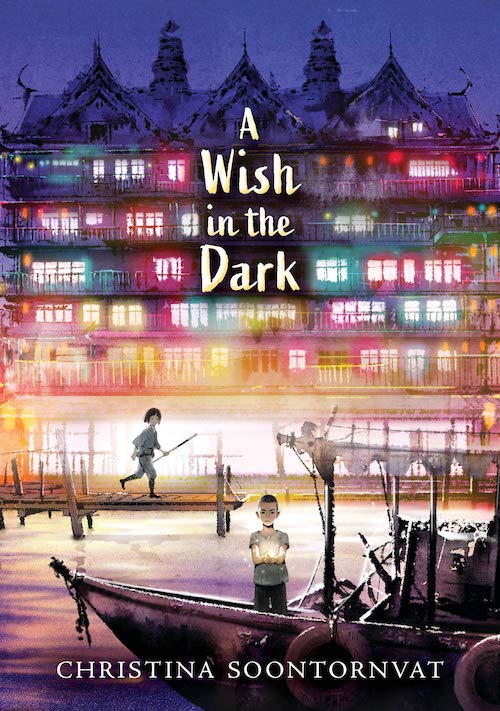Christina Soontornvat’s middle grade novel A Wish in the Dark is the dual point-of-view story of Pong and Nok beginning when they are nine and ending when they are thirteen. Pong is an orphan, an inmate in the women’s prison where Nok’s father serves as the warden. Because his pregnant mother stole food in the cruelly unequal city-state of Chattana run by the tyrannical Governor, Pong has to remain in prison until his thirteenth birthday even though his mother died when he was an infant. The prisoners, including Pong’s best friend Somkit, are starving and terrorized by bullies; their only pleasure are the mangoes that fall from the tree into their arms. Pong’s magic is his ability to hear the mangoes about to fall.

After Pong ends up on the wrong side of the Governor during an official visit and the Governor places a curse of eternal darkness on Pong, the boy decides to escape though it means leaving Somkit behind. His escape causes Nok’s father to be fired and her family to lose its status, and the young martial arts champion decides to hunt Pong down to get back in the Governor’s good graces. Things go horribly wrong for this “perfect” student and daughter. She learns a secret about her birth, and finds herself homeless and hunted as well.
Soontornvat, whose father grew up in Thailand, weaves folklore and Buddhist beliefs with present-day political, economic, and environmental questions. The Governor gained his office because he has the power to bring light. His magic illuminates the colorful orbs throughout the city, from the dim purple orbs of the impoverished East Side to the costly jade orbs that drive speedboats through the city’s canals and the golden orbs that radiate wealth and luxury. But Somkit, a gifted electrician, has found a way to use the sun to power the orbs, eliminating the need for the tyrant and his unfair laws. In return, the Governor will do everything to keep his power, including the creation of a new theology to supplant the humanity and generosity of the Buddhist monks. His theology, in one sentence:
The law is the light…The light shines only on the worthy.
It is the Prosperity Gospel, the idea that wealth and social position are proof of innate goodness. Those born to the poor or to the prisoners live predestined lives unless favor that can be easily revoked plucks them from the bottom of the caste heap. As the Governor tells Pong, “Those who are born in darkness always return.”
Along with a gripping, multi-layered story, Soontornvat transports the reader to an imagined Thailand with snow-capped mountains, monasteries and caves, urban canals, trees laden with fruit, and glowing lights in many colors. Readers learn how supernatural power can be awesome but isn’t always a good thing. In Soontornvat’s hands, Pong, Nok, Somkit, and their friends are superb guides to a world both far away and not there at all.